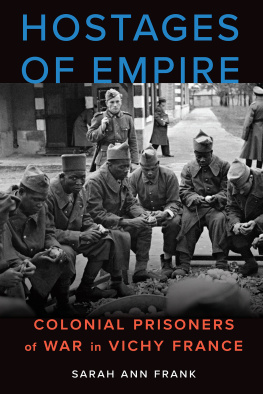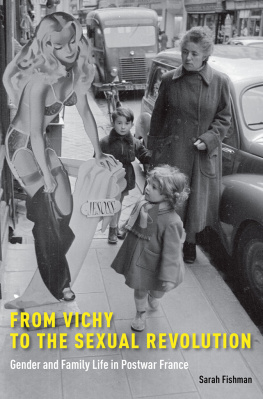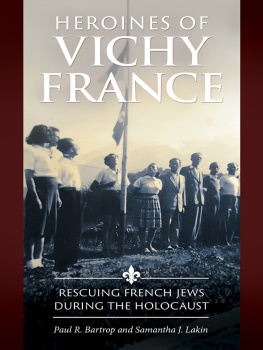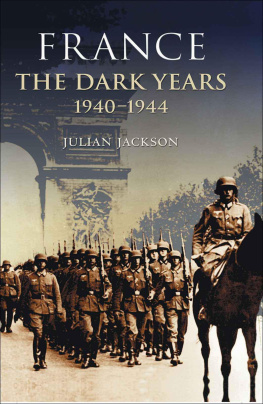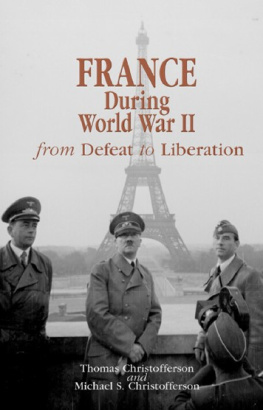NATIONAL REGENERATION IN VICHY FRANCE
National Regeneration in Vichy France
Ideas and Policies, 19301944
DEBBIE LACKERSTEIN
University of New South Wales, Canberra, Australia
First published 2012 by Ashgate Publishing
Published 2016 by Routledge
2 Park Square, Milton Park, Abingdon, Oxon OX14 4RN
711 Third Avenue, New York, NY 10017, USA
Routledge is an imprint of the Taylor & Francis Group, an informa business
Copyright Debbie Lackerstein 2012
Debbie Lackerstein has asserted her right under the Copyright, Designs and Patents Act, 1988, to be identified as the author of this work.
All rights reserved. No part of this book may be reprinted or reproduced or utilised in any form or by any electronic, mechanical, or other means, now known or hereafter invented, including photocopying and recording, or in any information storage or retrieval system, without permission in writing from the publishers.
Notice:
Product or corporate names may be trademarks or registered trademarks, and are used only for identification and explanation without intent to infringe.
British Library Cataloguing in Publication Data
Lackerstein, Debbie.
National regeneration in Vichy France:ideas and policies, 19301944.
1. FrancePolitics and government19141940. 2. FrancePolitics and government19401945. 3. FranceHistory19141940. 4. FranceHistoryGerman occupation, 19401945.
I. Title
944.0816-dc22
Library of Congress Cataloging-in-Publication Data
Lackerstein, Debbie.
National regeneration in Vichy France : ideas and policies, 19301944 /Debbie Lackerstein.
p. cm.
Includes bibliographical references and index.
ISBN 978-0-7546-6721-6 (hardcover) ISBN 978-1-3155-9745-4 (ebook) 1. FranceHistoryGerman occupation, 19401945. 2. FranceHistoryGerman occupation, 19401945Collaborationists. 3. World War, 19391945CollaborationistsFrance. 4. FrancePolitics and government19401945. 5. FrancePolitics and government19141940. 6. NationalismFranceHistory20th century. 7. Politics and cultureFrance. I. Title.
DC397.L18 2011
940.5344dc23
2011029474
ISBN 9780754667216 (hbk)
ISBN 9781315597454 (ebk-PDF)
ISBN 9781317089971 (ebk-ePUB)
Contents
Acknowledgements
This work has benefited greatly from the generosity and support of many people. I am grateful to colleagues at several universities. I began research for the PhD thesis on which the book is based at the University of Adelaide where the outstanding teaching of the late Professor Austin Gough inspired my interest in Occupied France. Dr Robert Dare generously stepped in to offer guidance and supervision at critical stages. Several colleagues in the School of Humanities and Social Sciences, University of New South Wales, Canberra, have shared their time to give constructive criticism and have been unfailing in their encouragement. Professor Robin Prior gave me invaluable criticism and support in difficult times. I would also like to thank Professor Annette Becker, Universit de Paris X (Nanterre), for help and hospitality in France. Professor Robert Paxton was also extremely generous in taking time during a very short visit to comment on an early draft.
My acknowledgements are due also to the following libraries and archives: the Barr-Smith Library, University of Adelaide; the Academy Library, University of New South Wales, Canberra; the National Library of Australia; the British Library; the library of the Universit de Lille III; the Archives Nationales de France; the Bibliothque Nationale de France; the Bibliothque de Documentation Internationale Contemporaine (BDIC); and the National Archives (UK).
I thank my publisher, Ashgate, in particular Emily Yates and Bethan Dixon.
Above all I thank family and friends who have been endlessly patient and understanding. Amongst many generous friends, Gwen McNeill has been a constant support. My partner Ashley Ekins has never wavered in his encouragement and confidence: his resilience is an inspiration.
Abbreviations
AN | Archives Nationales de France |
BN | Bibliothque Nationale de France |
CF | Croix de Feu |
CGQJ | Commissariat Gnral aux Questions Juives |
CGT | Confdration Gnrale du Travail |
FNC | Fdration Nationale Catholique |
FNSP | Fondation Nationale des Sciences Politiques |
IEQJ | Institute pour lEtude des Questions Juives |
JNP | Jeunesse Nationale Populaire |
JO | Journal Officiel |
LVF | Lgion des Volontaires Franais |
MSR | Mouvement Social Rvolutionnaire |
NA | National Archives (UK) |
PCF | Parti Communiste Franais |
PPF | Parti Populaire Franais |
PSF | Parti Social Franais |
RNP | Rassemblement National Populaire |
SF | Solidarit Franaise |
SGJ | Secrtariat Gnrale de la Jeunesse |
SOL | Service dOrdre Lgionnaire |
STO | Service du Travail Obligatoire |
Introduction
Regeneration
We have to restore France Show this to the world who observes her, to the adversary who occupies her, in all her calm, all her labour and all her dignity I invite you, above all, to an intellectual and moral recovery. Frenchmen, achieve this and you will see, I swear, a new France arise from your fervour.
Marshall Philippe Ptain, 25 June 1940
In May and June 1940, France suffered a rapid and total military collapse that plunged the nation into shock and confusion. On 16 June, only 37 days after the German armies crossed Frances borders, the Prime Minister, Paul Reynaud, resigned. Marshal Philippe Ptain, the 84-year-old hero of the First World War, led the defeatist camp to form a new government and to sue immediately for a cessation of hostilities. Ptain announced the Armistice on 17 June and signed it five days later. Hitlers desire for revenge and humiliation dictated that the formalities take place in the same village of Compigne and in the same railway carriage as the Armistice that had sealed Germanys defeat in the First World War. Anticipating total victory in the war and in order to relieve themselves of administrative burdens, the Germans divided France into two main zones, Occupied and Unoccupied, and allowed a national government to rule France from the small spa town of Vichy in the Unoccupied southern zone. The Etat Franais, more commonly known as the Vichy regime, governed France for the next four dark years of German occupation Frances annes noires.
France was, in several ways, unique amongst the nations defeated and occupied by Germany during the Second World War. As the greatest power to suffer such a fate, it always remained more important to Germany, both economically and strategically, than any other occupied country. In part due to this fact and because the war continued, relations with the occupier were more complex and underwent more change over the course of the war than anywhere else in occupied Europe.






